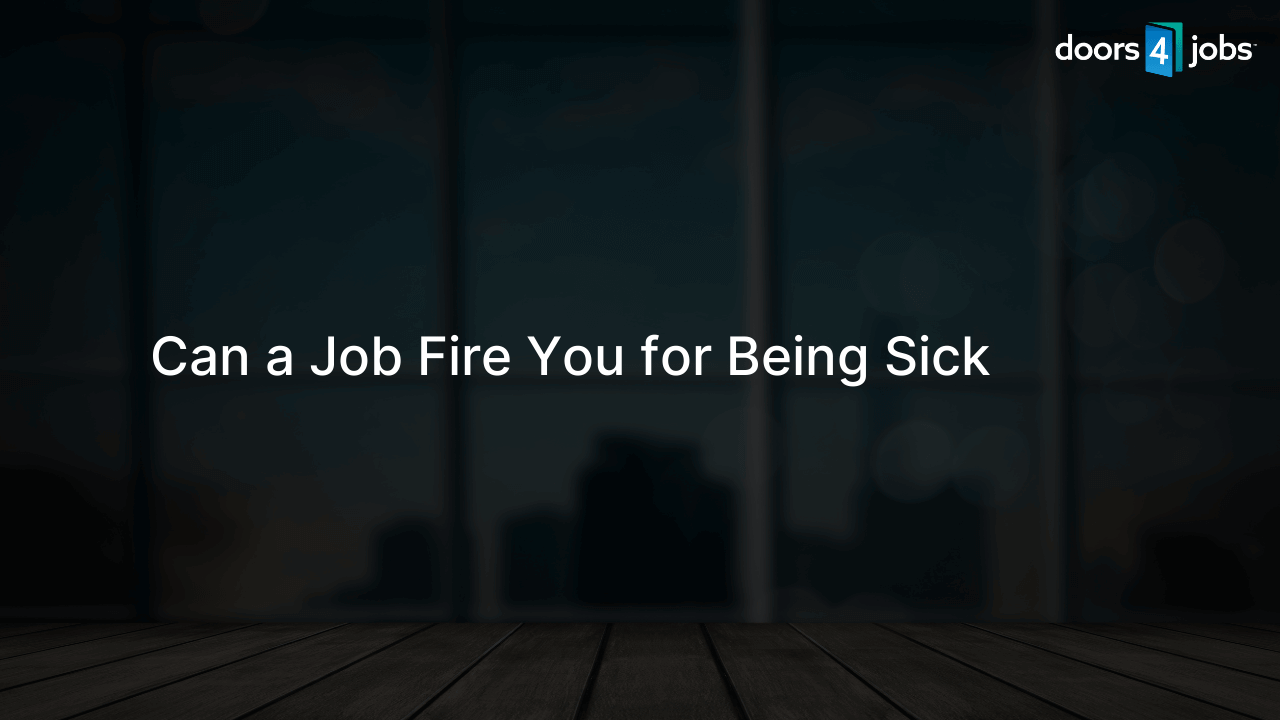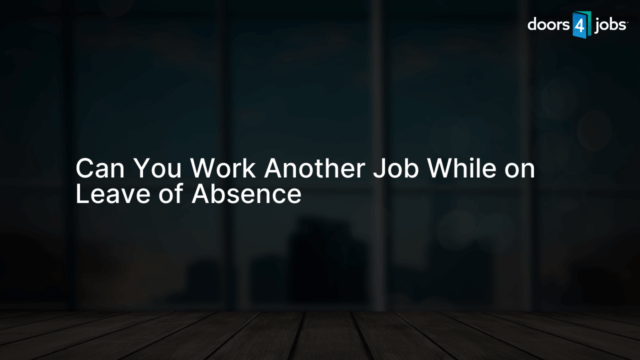Yes, a job can fire you for being sick, but it depends on the circumstances and employment laws in your location. Consistent attendance is generally expected, and excessive absences can lead to termination. However, legal protections like the Family and Medical Leave Act (FMLA) and the Americans with Disabilities Act (ADA) may apply, preventing unjust firing for illness-related reasons.
Understanding the General Rules
In most cases, jobs expect employees to maintain good attendance and may fire you for being sick if your absence becomes excessive. Employers often have attendance policies in place, and you must comply with their guidelines for sick days and leaves of absence.
Protection Under FMLA
The Family and Medical Leave Act (FMLA) protects eligible employees who need to take extended time off due to a serious health condition. To be eligible for FMLA coverage, you must work for a qualifying employer, have completed at least 12 months of employment, and have worked a minimum of 1,250 hours over those 12 months. If you meet these criteria, you are entitled to up to 12 weeks of unpaid leave without the risk of losing your job.
Steps to Applying for FMLA Leave
- Notify your employer of your need for leave.
- Provide the necessary certification from a healthcare provider.
- Follow your employer’s policies for requesting medical leave.
Protection Under ADA
The Americans with Disabilities Act (ADA) also offers protection if you have a disability that may require time off work or reasonable accommodations. Under ADA, an employer cannot discriminate against a person with a disability and must provide reasonable accommodations, including medical leaves, modified work schedules, or adjustments to job duties. However, an employer is not required to provide accommodations that would cause undue hardship on the business.
Requesting Accommodations Under ADA
To request accommodations under ADA, take the following steps:
- Inform your employer of your disability and its impact on your job.
- Discuss potential accommodations that could help you perform your job effectively.
- Provide documentation from a healthcare provider to support your request for accommodations.
At-Will Employment Limitations
In certain jurisdictions, employees are subject to at-will employment. This means that an employer can terminate your employment for any reason or no reason at all, as long as it is not discriminatory or otherwise illegal. It is essential to consult your local employment laws, as these can vary depending on where you reside.
Understanding Employer Attendance Policies
Employer attendance policies may vary between companies, and understanding your organization’s specific policy is crucial. Policies typically include information about employer expectations for attendance, steps to follow when requesting time off due to illness, and potential consequences for excessive absences. Ensure you are familiar with your company’s policy and adhere to it when managing your time off for sickness.
Temporary or Contingent Workers
If you are a temporary or contingent worker, you may not have the same level of job protection as permanent employees. While temporary workers may also be covered under FMLA and ADA, contingent or contract workers may fall outside these protections. Always review your contract and consult with your agency or HR representative to understand your rights as a temporary worker.
Seeking Legal Advice
If you believe you have been wrongfully terminated due to illness, it may be necessary to seek legal advice from an employment attorney. An attorney with expertise in employment law can help you understand your rights, evaluate your case, and determine the best course of action. It is crucial to act promptly, as there may be time limitations for filing a claim.
Open Communication with Your Employer
When experiencing health issues that impact your attendance at work, open and honest communication with your employer is key. Inform them of your condition and any necessary accommodations or medical leave needed. By proactively communicating your needs, you can work together to find a solution that benefits both parties and helps maintain job security during your time of illness.
Maintaining a Healthy Work-Life Balance
To minimize the risk of job loss due to sickness, prioritize maintaining a healthy work-life balance. This includes practicing good self-care, getting proper rest, staying active, eating well, and managing stress effectively. By taking care of yourself, you improve your overall well-being and reduce the likelihood of being sidelined by illness, thereby increasing your job security.
FAQ Section
Here are some frequently asked questions and answers related to job termination due to illness, aimed at providing further clarification on this important topic.
How long can I take off work without losing my job if I’m sick?
This depends on your employer’s attendance policy, FMLA eligibility, and any protections you may have under ADA. Review your company’s policies and consult with your HR department for specific information about time off allowances for illness at your workplace.
Are there specific illnesses that qualify for job protection under FMLA?
Under FMLA, a “serious health condition” is generally defined as an illness, injury, impairment, or physical/mental condition requiring inpatient care or ongoing treatment by a healthcare provider. This can include various conditions such as surgeries, pregnancies, chronic ailments, or acute illnesses. Consult your healthcare provider and employer to determine if your specific illness qualifies for FMLA protection.
What happens if my 12 weeks of FMLA leave have been exhausted and I am still sick?
If you have exhausted your 12 weeks of FMLA leave and still cannot return to work, you may be at risk of losing your job. However, your employer may choose to extend your leave as a company policy or reasonable accommodation under ADA if your illness is considered a disability. Ensure you maintain open communication with your employer to discuss your options during this time.
What are some examples of reasonable accommodations under ADA?
Reasonable accommodations under ADA may include modified work schedules, adjustments to job duties or responsibilities, provision of assistive tools, medical leaves, or workplace accessibility modifications. The specific accommodations will depend on your individual situation, and your employer is required to engage in an interactive process with you to determine the best solution.
How do I know if my illness qualifies as a disability under ADA?
Under ADA, a disability is defined as a physical or mental impairment that substantially limits one or more major life activities. If your illness significantly impacts your daily life or ability to work, it may qualify as a disability under ADA. Consult with your healthcare provider and discuss your situation with your employer to determine if your illness meets the criteria for ADA protection.











